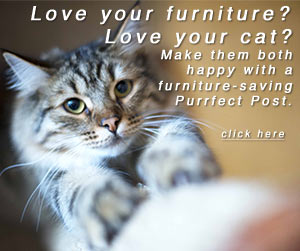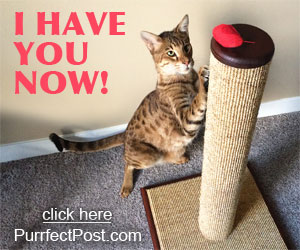How Do I Feed My Overweight Cat

If your veterinarian keeps telling you that your cat is overweight or if you can see it yourself, you might be wondering how in the world you can get him to lose weight. After all, most cats don't necessarily like to subscribe to a daily exercise plan.
Here are some tips for how to feed your overweight cat.
First, Have a Plan
The first thing you'll need to do is determine whether your cat needs to lose weight. Your cat should have a visible waist line when looking down at him from above, and you shouldn't have to push too hard to feel his ribs. Learn more: "Hands-On Guide to Checking if Your Cat Is at a Good Weight."
Next, visit your veterinarian and determine how much weight the doctor thinks your cat should lose. The doctor can then calculate how many calories per day your cat should take in to encourage that amount of weight loss.
Your veterinarian can also tell you whether you should simply decrease the amount of the current food you are feeding or change to a special prescription diet. If a change is necessary, it must be done gradually to avoid triggering GI upset or a food strike that may cause the serious condition of fatty liver disease.
Once you know how many calories of which food your veterinarian recommends, you can calculate how much food your cat should get every day based on calorie information on the food's packaging.
Don't Feed Free Choice
Many people leave food down for their cats all day, which is called free choice feeding. While many cats self-regulate and don't become overweight on this type of feeding, it is often part of the reason that indoor cats do get too heavy.
In the wild, cats' meals are staggered. They eat when they make a kill and rest in between. Meal feeding more closely mimics this natural type of feline eating.
Divide the amount of food that your cat should be getting per day into two or more feedings. You can also divide some of the daily amount into multiple servings and hide them around the home, so your cat will have to "hunt" them. Kibble can be placed in treat-dispensing toys, which helps your cat work for his food, too. This aids in keep his weight down and his mental ability sharp.
Feed Multiple Cats Separately
This is another thing that people in multiple cat homes might find difficult. However, it's important that each kitty gets his fair share of food without feeling like he has to fight for it and that your overweight kitty doesn't get too much.
Feeding cats separately is also important if any of the kitties has a special medical need for prescription food. Learn more here: "Tips for Feeding Cats in Multiple Cat Households."
Be Careful with Cat Treats
Even though most of them are small, many cat treats can have lots of calories. Remember that, if you are feeding treats on top of the number of calories that your cat should be getting every day to lose weight, he is probably going to maintain or gain.
One thing you can do is reserve a small number of kibbles from your cat's daily allowance to use as treats throughout the day. Your kitty loves the positive interaction from you during treat time and won't mind that the type of treat has changed.
Add Exercise to Your Cat's Day
While this isn't specifically related to feeding, it's an important part of helping your cat lose weight. For cats, exercise usually takes the form of play, and the type of play that cats like best is that which simulates a hunt.
Wand toys that you can use to get your cat stalking, running, and pouncing will be good for his weight and help keep him mentally healthy. You can learn specifics on how to do this here: "Interactive Playing with Wand Toys."
Another great idea is to use automated cat toys. These allow cats to hunt without your direct involvement. Some even have a setting that allows the toy to come on at differing, random intervals, so your cat has incentive to play and move while you're gone.
You May Also Like These Articles:
Quiz - Are You Making Cat Care Mistakes?
Dehydration in Cats: How Can You Tell If a Cat Is Dehydrated?
Will My Cat Love Me Less If I Feed Her Less?
Cat Weight Loss: How You Can Help Your Cat Lose Weight
Fatty Liver Disease in Cats (Hepatic Lipidosis)
You Love Spoiling Your Cat, but Should You?
Are You Shortening Your Cat's Life? - Slideshow
Obesity in Cats: Overview of Dangers and SolutionsNotice: Ask-a-Vet is an affiliated service for those who wish to speak with a veterinary professional about their pet's specific condition. Initially, a bot will ask questions to determine the general nature of your concern. Then, you will be transferred to a human. There is a charge for the service if you choose to connect to a veterinarian. Ask-a-Vet is not manned by the staff or owners of CatHealth.com, and the advice given should not delay or replace a visit to your veterinarian.





